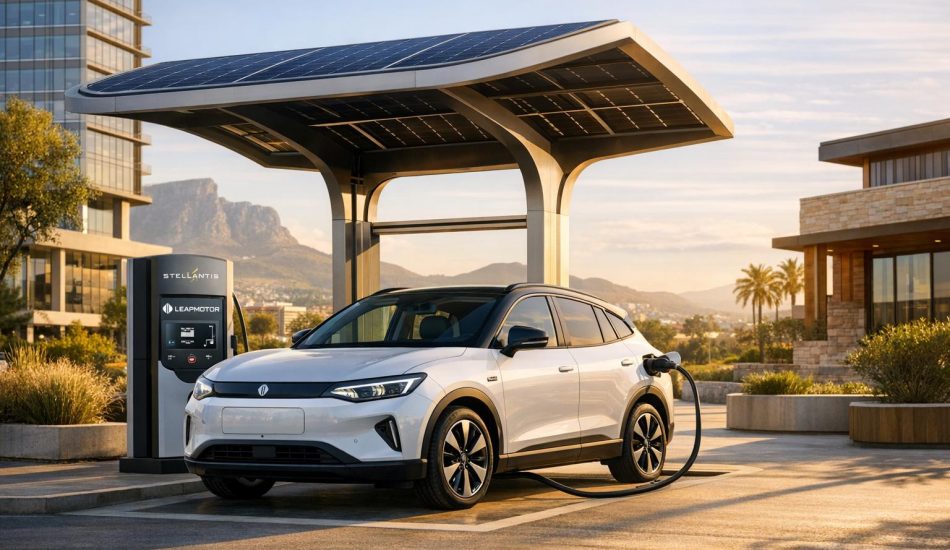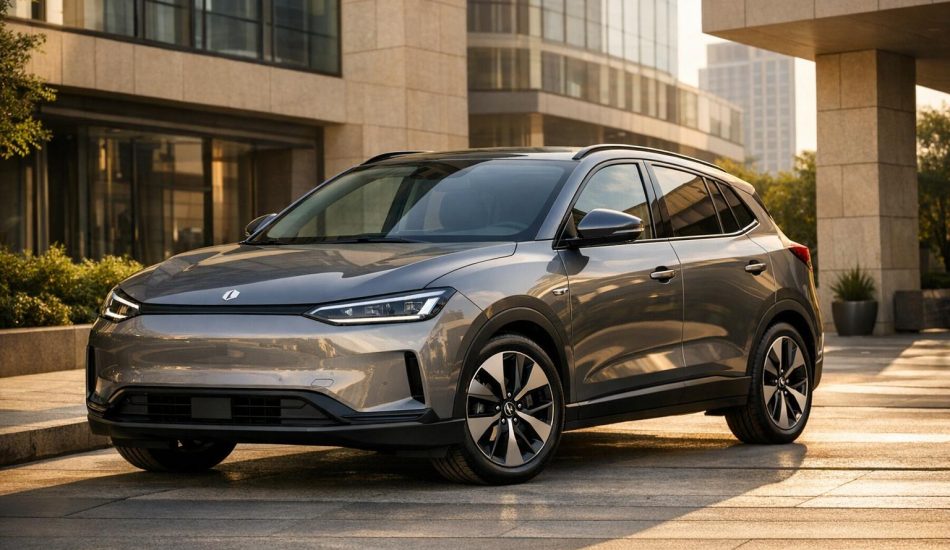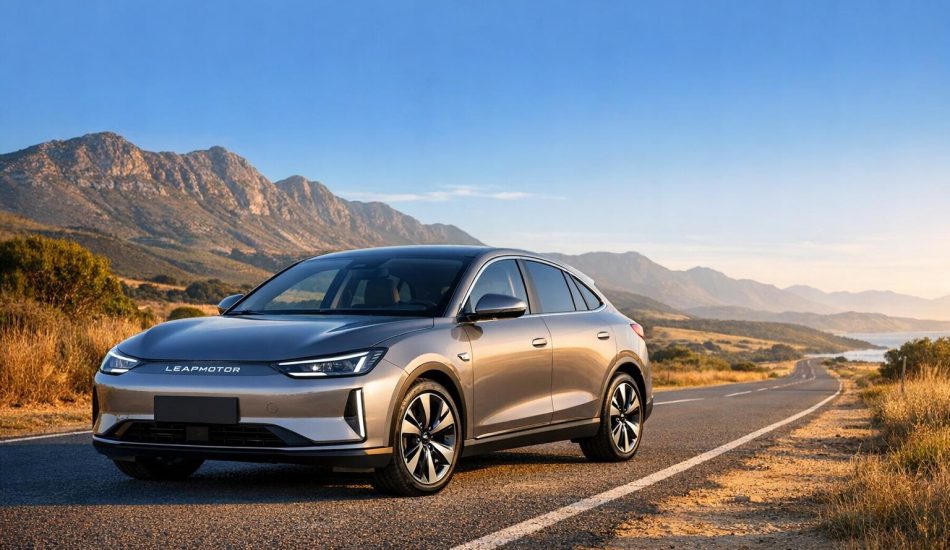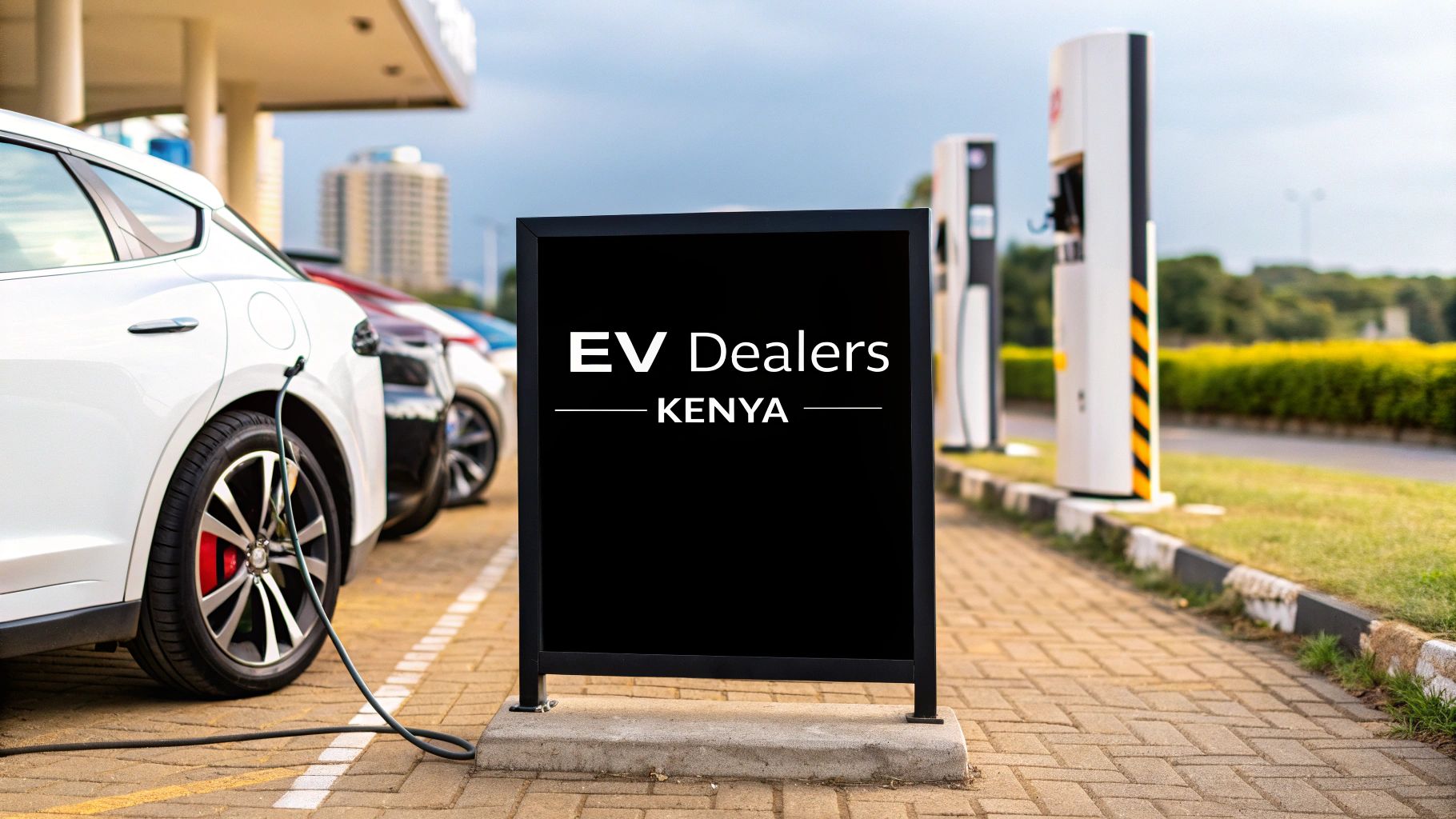
Thinking about making the switch to an electric car in Kenya? You're in good company. The EV scene here is buzzing, and it’s no longer a niche market. We're seeing more and more electric car dealers Kenya opening their doors, bringing in models from top global brands and making it easier than ever to go electric.
This guide is your roadmap. It's designed to help you find a dealer you can trust—someone who will be there for you long after you've driven off the forecourt.
The Rise of Electric Vehicles in Kenya
The move to electric cars in Kenya isn't some far-off dream; it's happening right now. What started as a small conversation among enthusiasts has quickly turned into a mainstream option for drivers wanting to cut running costs, enjoy a quieter ride, and reduce their environmental impact.
This isn't just a feeling; the numbers back it up. The growth has been nothing short of remarkable. Back in 2018, only 65 EVs were sold. Fast forward to 2023, and that number jumped to a staggering 4,047 units.
Just look at the last financial year (2022–2023). Sales more than doubled, climbing from 1,059 to 2,694 units. That gave EVs an 8.3% share of all new vehicle sales. It’s a clear sign that electric mobility is here to stay.
Key Drivers of EV Adoption
So, what's fuelling this change? It’s a mix of practical benefits and growing awareness. Both everyday drivers and businesses are realising that the long-term advantages of going electric are too good to ignore.
Here’s what’s really pushing things forward:
- Serious Savings: The chance to save big on fuel and maintenance is a massive pull for most Kenyans. It just makes financial sense.
- Government Backing: Policy matters. The government is creating a friendlier environment for EVs, and you can see how Kenya's draft e-mobility policy boosts electric vehicle uptake and what it means for buyers.
- Growing Charging Network: Range anxiety is becoming less of a concern as more public charging stations pop up across the country. It's still a work in progress, but it's moving in the right direction.
- More Cars to Choose From: A few years ago, your options were limited. Now, local dealers are offering everything from zippy city cars to family-sized SUVs.
The question for anyone considering an EV in Kenya is no longer "if," but "when"—and, crucially, "from whom." Getting this first step right by choosing a good dealer is the key to a great ownership experience.
Let's dive into how you can find and work with the best electric car dealers in Kenya.
How to Find and Vet Reputable EV Dealers
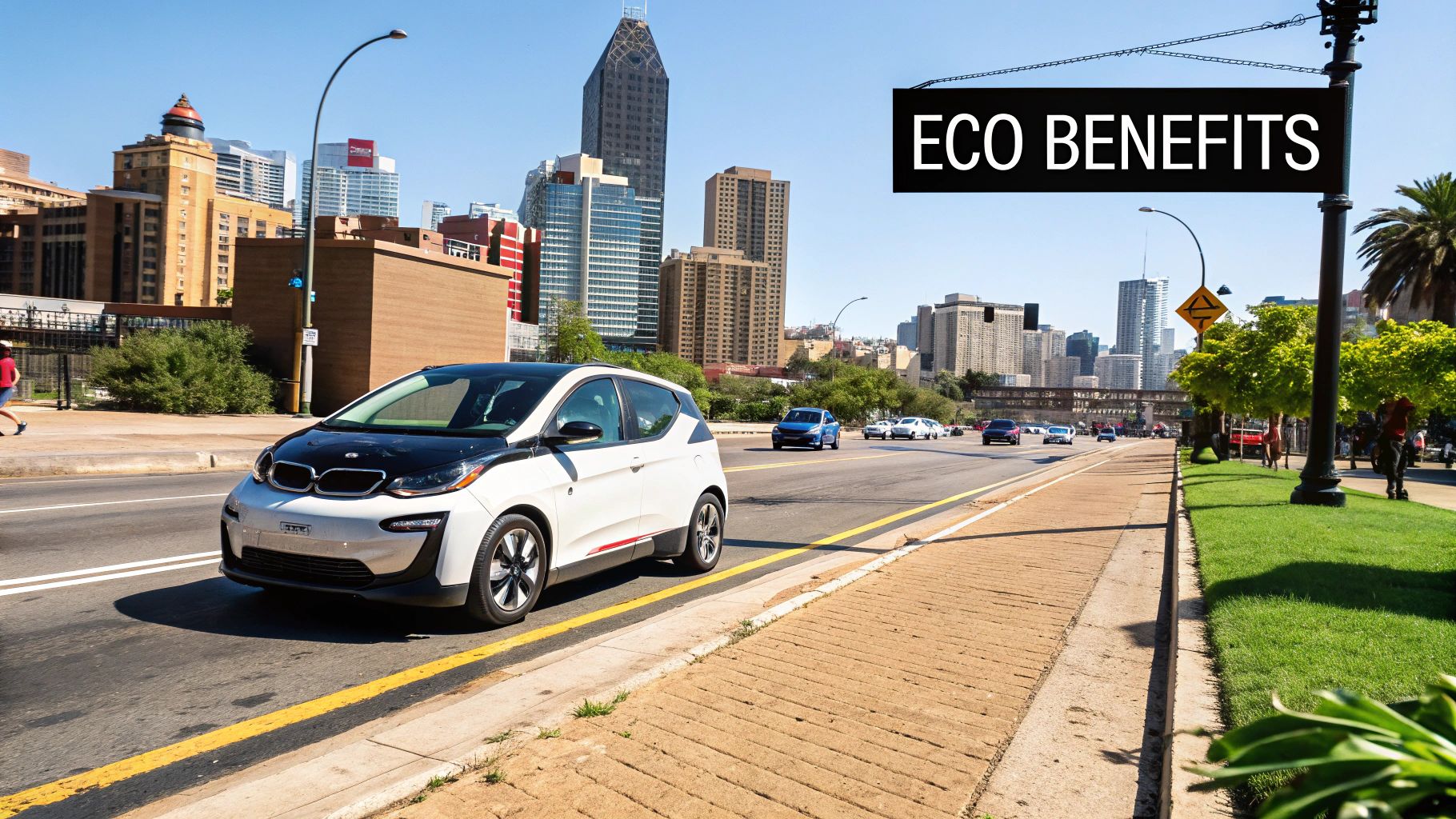
Finding the right EV dealership in Kenya isn't just about getting a good price; it's about starting a long-term relationship. The right partner will be there for you for years to come, but the wrong one can turn your EV dream into a real headache. The key is to tell the difference between official brand representatives and the unauthorised "grey market" importers who might not have the after-sales support you'll inevitably need.
A dealer's commitment—or lack thereof—is often obvious from the moment you walk through their doors. Do they have a professional showroom? A clean, well-equipped service centre? Most importantly, does the team actually know what they're talking about when it comes to electric vehicles? If they stumble over questions about battery health, charging protocols, or software updates, that’s your cue to be cautious.
This is more important than ever. The Kenyan automotive market is buzzing, with vehicle sales jumping 16.8% in the first half of 2025. This growth signals a real appetite for new tech, including EVs, which makes it crucial to find established and reliable electric car dealers Kenya. You can read more about the latest Kenyan automotive market trends on KBC.
Separating the Professionals From the Pack
When you start looking, your first filter should be for dealers who are officially recognised by the EV brands they carry. These are the dealerships with a direct line to manufacturer training, proper diagnostic tools, and genuine spare parts. For a modern electric car, these things aren't just nice to have; they're essential.
Don't be shy about asking direct questions about their credentials. Ask how long they've been dealing with EVs specifically, not just cars in general. Do their technicians have specialised EV training? Are they certified by the brand? A dealer who is proud of their expertise will have no problem answering these questions.
Green Flags to Look For
As you interact with different dealers, certain signs will tell you you're in good hands. Keep an eye out for these positive indicators:
- Transparent Service Plans: They should be able to clearly explain the maintenance schedule and costs. Remember, servicing an EV is worlds apart from a petrol car.
- Solid Online Reputation: Check out their reviews on Google and social media. More importantly, see how they respond to feedback, both good and bad.
- Active in the EV Community: A dealer who hosts events or shares educational content is showing a real commitment to the local EV scene, not just making a quick sale.
- Crystal-Clear Warranty Info: They should be able to walk you through the battery and powertrain warranty, explaining exactly what's covered, for how long, and how the claims process works.
A truly great dealer invests in your ownership experience, not just the initial sale. They understand that selling an EV is the beginning of a partnership and will have the infrastructure to support you with servicing, software updates, and any technical issues that may arise.
Red Flags to Avoid
On the flip side, some warning signs should have you heading for the exit. If you’re getting vague answers or sensing a lack of professionalism, trust your gut.
Here are a few major red flags you can't ignore:
- Vague Warranty Details: If they can't show you a clear, written warranty document or get shifty when you ask what's covered, that's a huge problem.
- No Dedicated EV Technicians: Your general mechanic isn't an EV specialist. If they don't have properly trained staff, they're not equipped for complex diagnostics or repairs.
- High-Pressure Sales Tactics: If they seem more interested in closing the deal than answering your technical questions, it’s a sign they don’t care about your long-term satisfaction.
By carefully measuring each potential dealer against these points, you can choose a partner who will make your journey into EV ownership in Kenya a smooth and enjoyable one.
Decoding EV Pricing, Import Duties, and Financing
When you start looking at electric cars in Kenya, the price you see on the windscreen is just the beginning of the story. To figure out what you'll actually pay, you need to dig into the total cost, which is heavily shaped by import duties, taxes, and a handful of other fees. Getting your head around these numbers is the best way to budget properly and avoid any nasty surprises down the line.
These extra costs aren't just small change; they can seriously inflate the final price. The EV market here is still finding its feet, and hefty import duties are a major roadblock for a lot of would-be buyers.
Let's take a real-world example. A popular model like the BYD Sealion 7 EV might land with a duty-free price of around 8.7 million KSh. But once you factor in all the necessary import duties and VAT, that figure can jump to nearly 14.6 million KSh. It's a significant leap, and it's why understanding the full cost is so crucial.
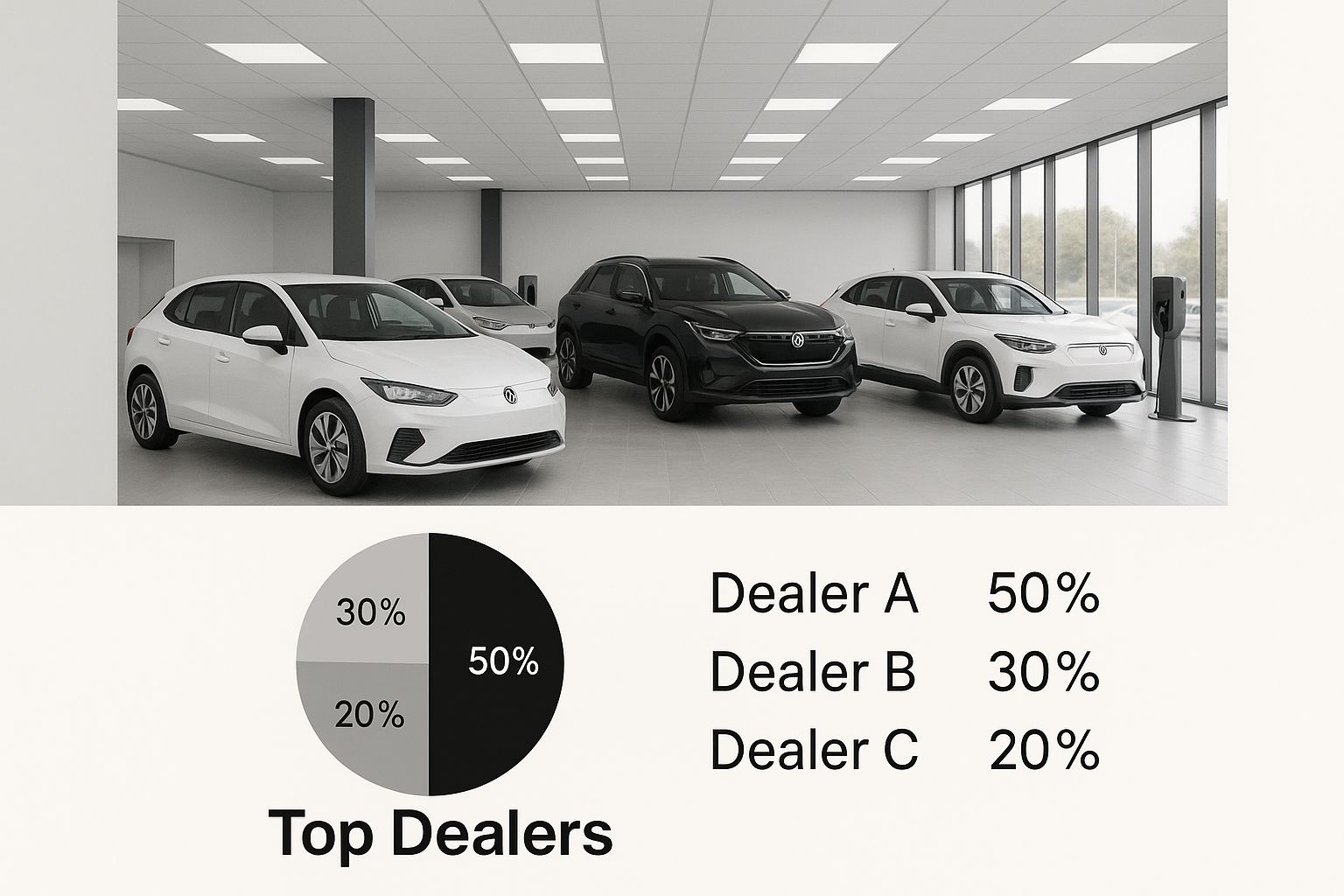
As you can see, both established names and new players are working hard to bring EVs to Kenya, but they're all operating within this tricky cost environment.
Breaking Down the On-the-Road Costs
When you get a quote from an electric car dealer in Kenya, always, always ask for the full "on-the-road" price. This single step ensures everything is included, so you don't get hit with unexpected bills later on.
So, what exactly goes into that final number? It's a mix of several key components:
- Cost, Insurance, and Freight (CIF): This is the base cost of the car itself, plus what it takes to get it shipped to the Port of Mombasa.
- Import Duty: A hefty tax calculated based on the CIF value.
- Excise Duty: Another tax that often changes depending on the vehicle's value and specs.
- Value Added Tax (VAT): This is currently 16%, and it's applied on top of the CIF, import duty, and excise duty combined.
- Registration Fees: The administrative costs for getting your new EV registered with the National Transport and Safety Authority (NTSA).
- Port and Clearing Charges: These are the fees for physically handling the car at the port and getting it through customs.
To give you a clearer picture, here’s a sample breakdown of how these costs can stack up for a typical imported EV.
Sample EV On-the-Road Cost Breakdown in Kenya
| Cost Component | Example Cost (KSh) | Description |
|---|---|---|
| CIF Value (Vehicle Cost) | 5,000,000 | The base price of the car including insurance and freight to Mombasa. |
| Import Duty (25% of CIF) | 1,250,000 | A standard tax on imported vehicles. |
| Excise Duty (20% of CIF) | 1,000,000 | An additional tax based on the vehicle's value. |
| VAT (16% on Total) | 1,160,000 | Applied to the sum of CIF, Import Duty, and Excise Duty. |
| Registration & Other Fees | 150,000 | Covers NTSA registration, port charges, and agent fees. |
| Total On-the-Road Cost | 8,560,000 | The final price you pay to drive the car away. |
As the table shows, the taxes and fees can add more than 70% to the original cost of the vehicle. This is why a detailed, itemised invoice is non-negotiable.
A transparent dealer will have no problem breaking down every single shilling for you. If they're hesitant, that's a red flag. Getting this clarity is your best tool for understanding exactly where your money is going. For a much deeper look into these costs, our Kenya EV import guide for 2025 covers it all.
Navigating Your Financing Options
The good news is that financing an electric vehicle in Kenya is getting easier. It used to be a real headache, but now more banks are starting to see the potential and are rolling out loan products specifically for EVs. Some even offer better terms than you'd get for a standard petrol car.
When you're talking to dealers, make sure to ask about their financing partners. Most of the reputable ones have relationships with banks and can often help make the application process a bit smoother.
Here’s a practical approach to finding the right financing:
- Talk to the Big Banks: Start with institutions known for green financing initiatives, like Stanbic Bank and NCBA Bank. Go directly to them and ask about their specific loan products for electric vehicles.
- Shop Around for Rates: Never take the first offer you get. Get quotes from at least three different lenders so you can compare interest rates, loan tenure, and the required down payment.
- Ask About Asset Financing: This is the most common way to buy a car in Kenya. The bank essentially buys the car for you, and you pay them back in monthly instalments over an agreed period.
By getting a firm grip on the costs and actively shopping for financing, you'll be in a much stronger position. It's all about moving forward with confidence and finding a deal that truly fits your budget.
Evaluating After-Sales Support and Maintenance
Your journey with an electric car dealer in Kenya doesn't end when you drive off the forecourt. In many ways, it's just getting started. The long-term performance and health of your new EV will lean heavily on the quality of after-sales support you get.
A dealer's real commitment shines through in their maintenance capabilities. You have to ask yourself: are they just moving boxes, or have they genuinely invested in the specialised gear and people needed to service these cars? It’s a crucial difference, because EVs are a whole different ball game compared to the petrol or diesel cars we're used to.
Assessing Service Centre Capabilities
The first place to look is their service centre. Don't be shy—ask for a tour. Any dealer worth their salt will be proud to show you their dedicated EV service bays, complete with the specific diagnostic tools and high-voltage handling equipment that are essential for modern electric cars.
While you're there, pay close attention to the team. Ask about their technicians' training and certifications. Have their mechanics been officially trained by the EV manufacturer? This is a deal-breaker. An untrained mechanic working on an EV's high-voltage battery or powertrain can lead to some seriously expensive—and dangerous—mistakes.
Another huge piece of the puzzle is the availability of spare parts. Sure, EVs have fewer moving parts, but things like brake pads, tyres, coolant, and even electronic modules will eventually need replacing. Ask the dealer point-blank about their stock of common EV-specific parts. You don't want to be stuck waiting weeks for a simple component to be shipped from halfway across the world. A well-prepared dealer anticipates this.
Understanding Warranty and Software Support
The warranty is probably the single most important document you'll discuss. For an EV, the warranty covering the battery and powertrain is everything. You need to get crystal-clear answers on these points:
- Warranty Type: Is it a local warranty backed by the dealer and the manufacturer right here in Kenya, or an international one that’s a nightmare to claim?
- Coverage Details: What's the exact duration and mileage for the battery warranty? The industry benchmark is around 8 years or 160,000 kilometres.
- Battery Health Guarantee: Does the warranty promise that the battery will hold a certain percentage of its original capacity (say, 70%) over that period?
A strong, locally serviceable warranty is your single greatest protection for your investment. If a dealer is vague or cannot provide clear, written documentation on warranty terms, consider it a major red flag.
Beyond the physical hardware, remember that software is the brain of your EV. Regular updates can boost efficiency, unlock new features, and patch bugs. You need to confirm the dealer can handle these updates, whether they're done over-the-air (OTA) or need a visit to the service centre. This keeps your car modern and running at its best.
Finally, regular battery health checks are vital for the car's longevity. A good electric car dealer in Kenya will offer this service and give you detailed reports on your battery’s condition. This proactive approach to care doesn't just protect your car's value; it's a core part of why EV maintenance is cheaper than petrol cars in Africa. Picking a dealer with solid support ensures you actually get to enjoy those savings over the years.
Making the Most of Your Test Drive and Charging Setup
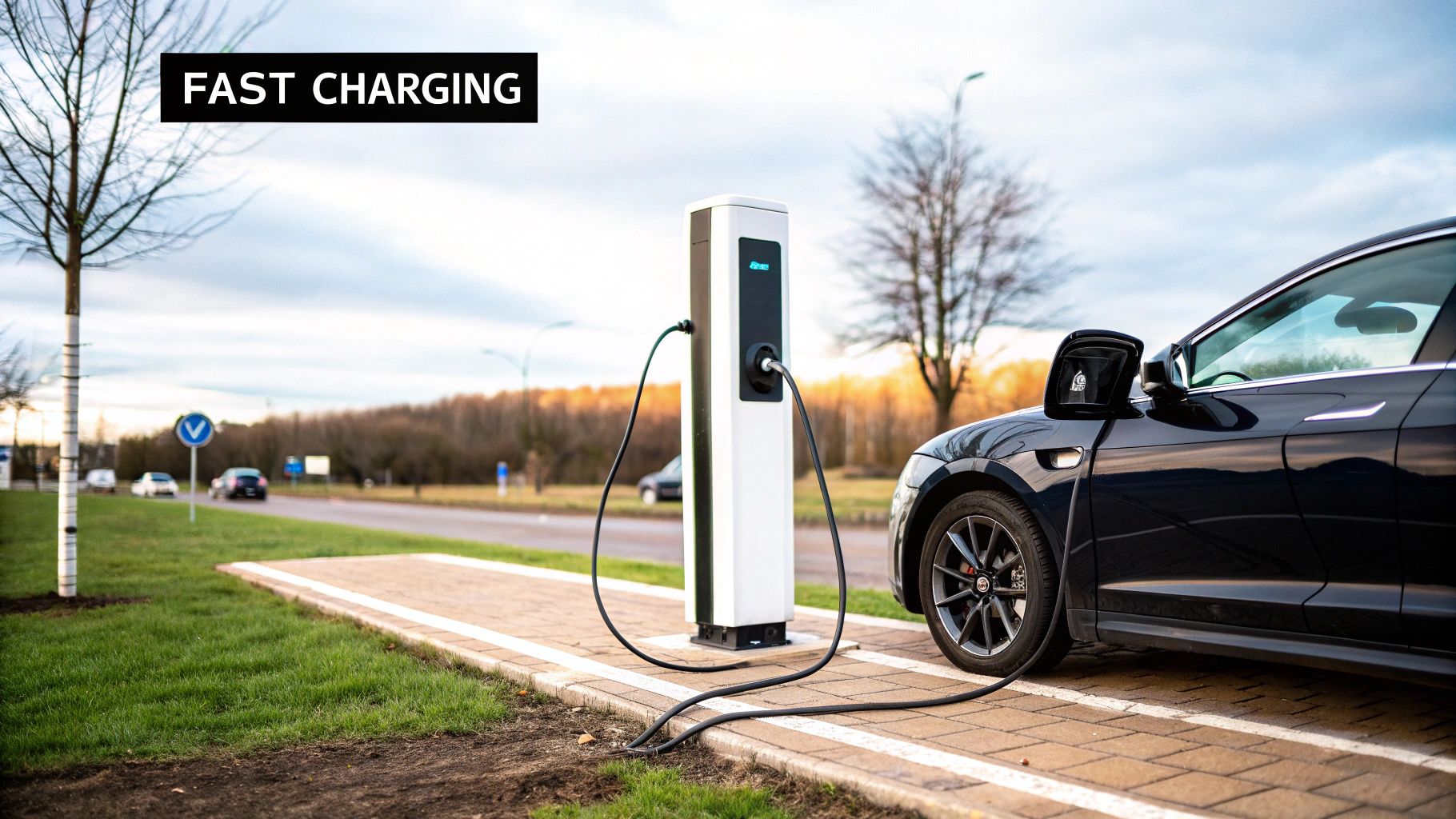
The test drive is your single best opportunity to see how an EV will actually slot into your life here in Kenya. It’s far more than a quick spin around the block. This is where the brochure promises meet the reality of our roads, traffic, and your unique driving habits.
Don’t let them rush you. Insist on taking the car on the routes you drive every single day. Take it on your commute to the office. Do the school run. Try to navigate that tight parking spot at the supermarket.
This real-world context is everything. You'll get a true feel for the instant torque when pulling into a gap in traffic on Waiyaki Way and see what the car's range really looks like under conditions you face daily—not just some idealised number on a spec sheet.
Simulating a True Ownership Experience
To really make this count, you need to zero in on what makes driving an electric car so different. These are the little things that will shape your experience long after that new-car smell has faded.
Here's what I always tell people to focus on:
- Regenerative Braking: Find a few hills. Play with the regenerative braking settings if you can. Does it feel natural? See how much range you can actually add back on a long downhill stretch—it’s a game-changer for efficiency.
- One-Pedal Driving: If the car has a "one-pedal" mode, give it a proper try in heavy traffic. For many, it completely transforms the stop-start grind of Nairobi congestion, making it far less of a chore. See if it clicks for you.
- The Sound of Silence: Pay attention to the noise, or lack thereof. With no engine rumbling away, you'll notice other sounds more, like wind noise at high speeds or the sound of the tyres on the tarmac. Is it a peaceful cocoon or does something else become annoying?
Ultimately, the test drive should answer a simple but crucial question: "Can I genuinely see myself driving this every day for the next five years?" Mess with the infotainment system. See how it feels to park. Be critical.
Discussing Your Charging Solution
Once you're done with the drive, the conversation has to shift to charging. Honestly, this is just as critical as the car itself. You'll be doing 80-90% of your charging at home, so this part has to be seamless.
You need to ask any electric car dealers in Kenya some very direct questions. Is a proper Level 2 wall box charger included in the car's price, or is it an added cost? If they provide one, who installs it?
A good dealer won't just sell you a car; they'll have a trusted, certified electrician they partner with. They should be able to inspect your home's setup and give you a clear quote for the installation.
Lastly, talk about life beyond your driveway. What about the public charging network? A dealer who knows their stuff should be able to give you the lay of the land in Kenya right now. They can walk you through the car’s navigation system for finding stations, explain the difference between AC and DC fast charging, and set realistic expectations for what a long-distance trip actually involves. This is the kind of practical guidance that makes you feel confident you're ready for the switch to electric.
Right, you’ve done the hard yards. You've researched, test-driven, and you're pretty sure you've found the one. But before you sign anything, let's take a beat and run through one final check.
This isn't about getting cold feet. Think of it as your last-minute sanity check – a way to make absolutely sure that your excitement hasn't glossed over any important details. It's the final step to confirming you've picked the right car and, just as importantly, the right dealer.
Final Check on the Dealer and the Car
First things first, let's lock down the specifics about the dealership and the actual vehicle you're about to own. This is where you make sure all the talk and promises from the sales floor match the reality on paper.
- Take a Look at the Service Centre: Ask for one more peek at their EV service bay. You want to see the diagnostic gear and the technicians with your own eyes. It’s a gut check that they can actually back up their promises of after-sales support.
- Ask About Spare Parts (Again): Reconfirm what they told you about common spare parts. A good question to ask is, "What essential EV parts do you keep in stock right here in Kenya?" You don't want to be waiting weeks for a simple component to be shipped from overseas.
- Match the VIN: Find the Vehicle Identification Number (VIN) on the car itself (usually on the dashboard or driver's side door jamb). Make sure it's the exact same number on your sales agreement and all the official paperwork. A mismatch here is a massive headache you don't need.
Before your pen touches any paper, insist on seeing the final, all-inclusive "on-the-road" price. This isn't just the sticker price; it should break down every single shilling, including the car's cost, taxes, duties, and any other fees. No surprises.
Going Through the Paperwork with a Fine-Tooth Comb
The documents you sign are legally binding. It's boring, I know, but spending a few extra minutes here can save you a world of trouble later. This is your chance to spot anything that looks off before it becomes your problem.
Here are the crucial documents you need to inspect:
- The Warranty Agreement: Don't just skim it. Read the actual warranty document. Confirm the coverage duration and mileage for the battery and the rest of the powertrain. Crucially, make sure it’s a local warranty that can be honoured in Kenya, not some international one that's a nightmare to claim.
- Import and KRA Papers: Ask to see the official import documents and proof that all taxes and duties have been paid to the Kenya Revenue Authority (KRA). This is your proof that the car is in the country legally and everything is above board.
- The Sales Agreement: Go through the final contract line by line. Check that the price you agreed on is correct. Make sure any extras you negotiated, like a home charger or floor mats, are explicitly listed. Double-check the delivery date.
Ticking off these boxes means you’ve done your due diligence. You’re not just buying an EV; you're making a major investment. This final check ensures you're partnering with one of the best electric car dealers Kenya can offer, setting you up for a smooth and exciting ride into the world of electric cars.
Ready to find your perfect electric vehicle without the hassle? At EV24.africa, we simplify the entire process, from finding the right model to handling importation and registration. Explore our wide selection of EVs and start your electric journey with confidence today. Visit EV24.africa to learn more.


